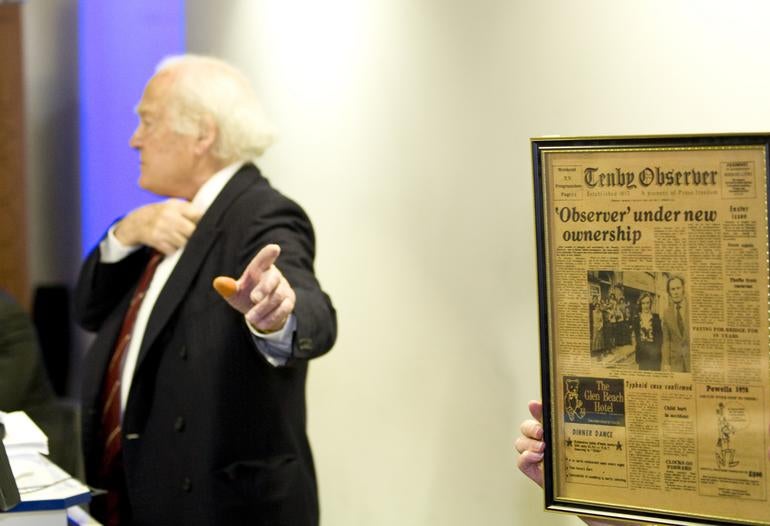
Sir Ray Tindle, the octogenarian owner of Tindle Newspapers, hit out today at ‘damaging and dangerous rhetoric’proclaiming the demise of local newspapers.
Making a case for their survival, Tindle said talk of the demise of the local press was ‘unjustified’as he urged larger publishing groups to stop comparing current revenue figures with those of the last boom period.
‘Let’s go back to more normal years before the boom. Our profits for the two years of this dreadful recession are as near as dammit the same as those of the normal pre-boom times of a decade ago,’Tindle told the Press Gazette Local Heroes conference, in London.
‘We were happy then and we are not unhappy now with both sets of figures.”
Many leading media analysts have been quick to write-off the prospects of local newspapers capturing their past glories.
Last year Enders Analysis predicted that up to half of Britain’s 1,300 local and regional newspapers will close within the next five years.
Tindle conceded that many dailies had ‘had a caning’but, quoting Newspaper Society figures, said only 60 newspapers had closed in recent months and gloomy predictions needed to be ‘put in perspective”.
‘You have all read and heard these merchants of doom. It is common now to hear that the Press has had its day – paid-for newspapers are finished, and so on. But they are all wrong; the true picture is quite different,’he said.
Tindle said that since the start of the downturn his company had bought or launched 12 weekly titles and revenues for his 150 weekly papers were already rising again.
‘Is this a collapse of local newspapers? No, it is not. Will half the press – over 600 newspapers – be dead in three more years? Of course not.
‘I’ve been hearing all that nonsense about the dire state we’re in for 63 years. I heard about the impending death of local weeklies in the Sixties when Lord Thomson launched all his local evenings and when Woodrow Wyatt brought out all his full colour, offset papers.
‘I heard all about our demise again when local commercial radio arrived in the Seventies and I certainly heard it very strongly when free newspapers swept the country in the Eighties. Each time we were on our way to the knacker’s yard!”
Tindle outlined how his ‘small private company’had ‘no debts, no bank loans, no overdraft, no investors’yet was still able to keep papers alive.
‘We don’t run our titles directly from a head office,’he said. ‘Each is run locally by local management and a magnificent staff.
‘We find this is possible, in most cases, and so far we have come through this recession, which has seen 5,000 newspapermen made redundant, without losing a single title and without making a single journalist redundant and yet remaining completely viable throughout as a group.”
Tindle drew attention to the new ‘hyper-local’papers he launched in North London, in March, as a way to offset losses of £192,000 made by a larger sister weekly and prevent a number of redundancies.
Each of these four papers had a net income around £1,000 a week, he said, and was now on target to offset the losses of the larger paper.
Email pged@pressgazette.co.uk to point out mistakes, provide story tips or send in a letter for publication on our "Letters Page" blog
